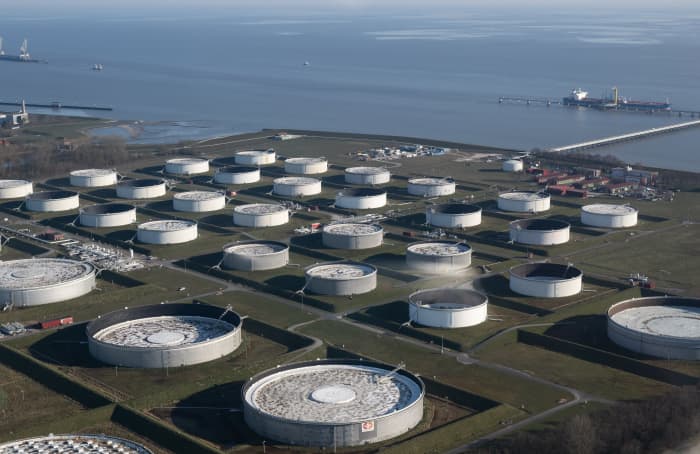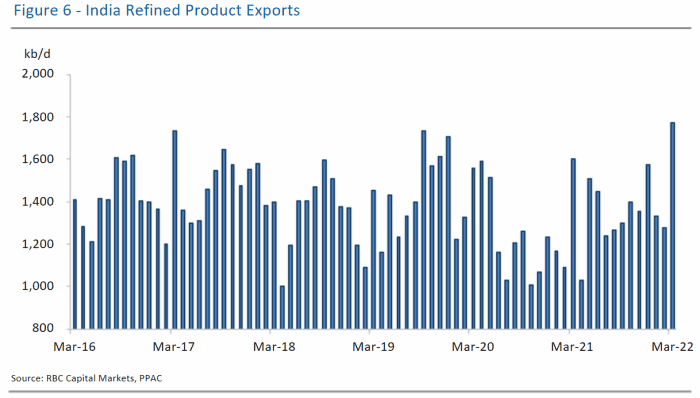‘We have a growing suspicion that India is becoming the de facto refining hub for Europe’: RBC’s Tran
May 31, 2022
William Watts

David Hecker/Getty Images
In an unexpected twist, the European Union’s plan to ban imports of Russian crude in response to Moscow’s invasion of Ukraine appears to be transforming India’s role in the global oil trade.
“As the EU weans from Russian refined product, we have a growing suspicion that India is becoming the de facto refining hub for Europe,” said Michael Tran, global energy strategist at RBC Capital Markets, in a Tuesday note.
It’s all part of the seismic displacements taking place across the physical market for crude and products in the aftermath of Russia’s late-February invasion and the resulting rounds of sanctions placed on Moscow.
EU leaders agreed Monday to embargo most Russian oil imports into the bloc by year-end as part of new sanctions agreed at a summit. While the agreement marks a hard-fought policy victory for the West, the reshuffling of global trade flows are set to prove economically inflationary for all nations involved as long as the war drags on, Tran said.
That will make sourcing barrels more expensive and keep upward pressure on oil pricing, the analyst said. The U.S. oil benchmark CL.1, +2.90% CLN22, +2.90% ended the day lower on Tuesday after earlier trading near a three-month high just shy of $120, but ended may with a strong gain. Brent crude BRN00, +1.14%, the global benchmark, ended higher and was also up for the month.
Meanwhile, India’s new role comes as it loads up on discounted Russian crude, which it has been refining at a torrid pace and then exporting refined products (see chart below).


David Hecker/Getty Images
In an unexpected twist, the European Union’s plan to ban imports of Russian crude in response to Moscow’s invasion of Ukraine appears to be transforming India’s role in the global oil trade.
“As the EU weans from Russian refined product, we have a growing suspicion that India is becoming the de facto refining hub for Europe,” said Michael Tran, global energy strategist at RBC Capital Markets, in a Tuesday note.
It’s all part of the seismic displacements taking place across the physical market for crude and products in the aftermath of Russia’s late-February invasion and the resulting rounds of sanctions placed on Moscow.
EU leaders agreed Monday to embargo most Russian oil imports into the bloc by year-end as part of new sanctions agreed at a summit. While the agreement marks a hard-fought policy victory for the West, the reshuffling of global trade flows are set to prove economically inflationary for all nations involved as long as the war drags on, Tran said.
That will make sourcing barrels more expensive and keep upward pressure on oil pricing, the analyst said. The U.S. oil benchmark CL.1, +2.90% CLN22, +2.90% ended the day lower on Tuesday after earlier trading near a three-month high just shy of $120, but ended may with a strong gain. Brent crude BRN00, +1.14%, the global benchmark, ended higher and was also up for the month.
Meanwhile, India’s new role comes as it loads up on discounted Russian crude, which it has been refining at a torrid pace and then exporting refined products (see chart below).

RBC CAPITAL MARKETS
Here’s how the puzzle pieces fit together, according to Tran:
India is buying record amounts of severely discounted Russian crude, running its refiners above nameplate capacity, and capturing the economic rent of sky-high crack spreads and exporting gasoline and diesel to Europe. In short, the EU policy of tightening the screws on Russia is a policy win, but the unintended consequence is that Europe is effectively importing inflation to its own citizens. This is not only an economic boon for India, but it also serves as an accelerator for India’s place in the new geopolitically rewritten oil trade map. What we mean is that the EU policy effectively makes India an increasingly vital energy source for Europe. This was historically never the case, and it is why Indian product exports have been clocking in at all-time-high levels over recent months.
So does India’s example mean that Russian crude no longer bound for Europe will just end up elsewhere? That’s unlikely, according to Tran.
He expects the EU ban to back out around 1.2 million to 1.5 million barrels a day (mbd) of Russian exports. They will have to find a home elsewhere, particularly Asia.
So far, China has yet to increase imports, let alone Russian barrels, but scope for India, which has “already been backing up the truck and buying discounted Russian barrels in size,” to further boost purchases appears limited. Over time, Russian storage will fill and production will begin to falter, Tran said.
He noted that Russian floating crude storage now stand near 2 million barrels, down from 3.5 million a month ago, while refined products remain unchanged near 4 million barrels.
“This implies that barrels have continued to move in a relatively fluid state and storage levels have yet to be stressed, for now, but given the ban, the directional arrows of process would suggest that the wheels are in motion,” he said.
Here’s how the puzzle pieces fit together, according to Tran:
India is buying record amounts of severely discounted Russian crude, running its refiners above nameplate capacity, and capturing the economic rent of sky-high crack spreads and exporting gasoline and diesel to Europe. In short, the EU policy of tightening the screws on Russia is a policy win, but the unintended consequence is that Europe is effectively importing inflation to its own citizens. This is not only an economic boon for India, but it also serves as an accelerator for India’s place in the new geopolitically rewritten oil trade map. What we mean is that the EU policy effectively makes India an increasingly vital energy source for Europe. This was historically never the case, and it is why Indian product exports have been clocking in at all-time-high levels over recent months.
So does India’s example mean that Russian crude no longer bound for Europe will just end up elsewhere? That’s unlikely, according to Tran.
He expects the EU ban to back out around 1.2 million to 1.5 million barrels a day (mbd) of Russian exports. They will have to find a home elsewhere, particularly Asia.
So far, China has yet to increase imports, let alone Russian barrels, but scope for India, which has “already been backing up the truck and buying discounted Russian barrels in size,” to further boost purchases appears limited. Over time, Russian storage will fill and production will begin to falter, Tran said.
He noted that Russian floating crude storage now stand near 2 million barrels, down from 3.5 million a month ago, while refined products remain unchanged near 4 million barrels.
“This implies that barrels have continued to move in a relatively fluid state and storage levels have yet to be stressed, for now, but given the ban, the directional arrows of process would suggest that the wheels are in motion,” he said.
No comments:
Post a Comment